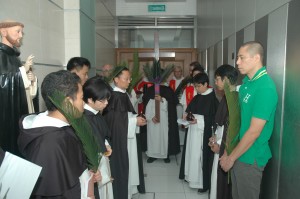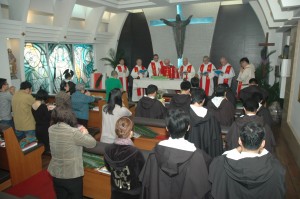|
Isaiah 50:4-7 |
Philippians 2:6-11 |
Luke 22:14 – 23:56 // Luke 23:1 – 49 |
 Today we celebrate Palm Sunday, also called Passion Sunday. It introduces us into Holy Week, during which we commemorate the chief mysteries of our faith and contemplate the words and deeds of the Lord in the last days of his earthly life. Today we celebrate the triumphant entrance of Jesus into Jerusalem to accomplish the great mystery of redemption through his Passion, Death, and Resurrection.
In simplicity of faith, let us now join the procession of the children of Jerusalem to acclaim, honor and praise Christ our King and Lord. Let us welcome him into our hearts and homes so that he may rule and govern our lives.
Jesus is the King that comes not to dominate, but to serve and to give his life as a ransom for the human race. That is why, after the joyful procession, today’s liturgy changes the liturgy of his Passion.
The Passion of Jesus is the supreme sign of love and mercy of the Father. After the drama of so much love and so much suffering, the crowd went back beating their breast. In the story of the Passion, the divinity of Jesus remains hidden; instead, the suffering servant is manifested in all his pain and misery.
The same Jesus, who escaped from the crowd which wanted to make him king, today accepts to be honored and we join him in his triumphal entry in Jerusalem. The humiliation of Christ is contrasted with the highest honor. But how fickle this world is! Those who acclaim Christ today as King will cry for his blood within a few days!
The lowliness of Christ as the servant and his majesty as the Lord both appear in today’s liturgy. He enters the city humbly, on the back of a donkey. He is acclaimed by exalting crowds, but his earthly glory is short-lived. His Kingdom is not of this world. The red carpet treatment the people give him ultimately contributes to his condemnation.
In the suffering Christ we discern the human spirit buffeted by enemies, but still loyal to the Lord God. He chose to be humiliated one for the sake of all the lonely ones whom he has served. The depth of his abasement is the point at which Christ is fully the man of others. He became a brother and a servant of all, even to the extent of suffering and dying for them. He emptied himself: he was one like us, one with us and one of us in all things, except in sin. He died a shameful and miserable death, and this man was God. We have a God who died for us and has become a source of life for us. He lives and gives life. By his wounds we are healed.
The life and death of Christ have not only benefited our human life on earth, it has changed our very purpose in life, our relationship with God and opened the gates of heaven for us.
Millions of our brothers and sisters, through no fault of their own, have not yet heard the Good News of God’s infinite love for them; but God will find his way of extending the benefit of his love for them. There are also millions who have heard the Good News of Jesus and rejected it; God knows how to be merciful to them, too. But what about us, professed followers of Christ? During this Holy Week we should be repeatedly reminded of what God has done and is continuing to do for us. We can only beat our breast in humble contrition, for we are unworthy of the infinite love of God.
If we did not offend Jesus openly as the soldiers did on Calvary, or Pilate that condemned the innocent Christ for fear of the Jews, or Judas Iscariot that betrayed him for thirty pieces of silver; we may have done so indirectly by our indifference and negligence. Are we much better? How often have we offended him for similar motives? And we have no excuse, for we should know better than they, as to what Christ means for us.
 Fr. Dionisio Cabezón, O. P.
St. Dominic’s Priory
 Macau, March 23, 2013

